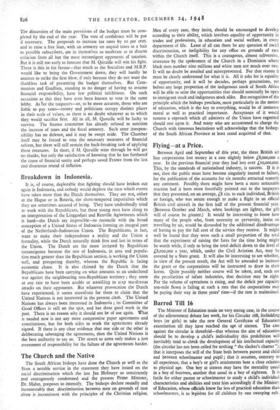Flying—at a Price.
Between April and September of this year, the three British air line corporations lost money at a rate slightly below L8,000,000 a year. In the previous financial year they had lost over £10,000,000. This, by the standards of nationalised industry, is success. If it is not, then the public must have become singularly inured to failure, for the publication of the accounts for six months attracted scarcely any comment. Possibly,there might have been a more noticeable reaction had it been more forcefully pointed out to the taxpayers that they presented, on an average, £8 12s. to each individual, British or foreign, who was astute enough to make a flight in an official British civil aircraft in the first half of the present financial year. (Between October and March, when bookings are lighter, the gift will of course be greater.) It would be interesting to know how many of the people who, from necessity or perversity, insist on travelling by air, would be dissuaded by the additional disadvantage of having to pay the full cost of the service they receive. It might well be found that they were such a small proportion of the total that the experiment of raising the fares for the time being might be worth while, if only to bring the total deficit down to the level of £8,000,000 a year, which, under the Civil Aviation Act, may be covered by a State grant. It will also be interesting to see whether, in view of the present result, the Act will be amended to increase the grant or the corporations will be instructed to draw in their horns. Quite possibly neither course will be taken, and, such are the peculiarities of infant industries, that decision may be right. For the volume of operations is rising, and the deficit per capacity ton-mile flown is falling at such a rate that the corporations may be paying their way in three years' time—if the rate is maintained.


































 Previous page
Previous page